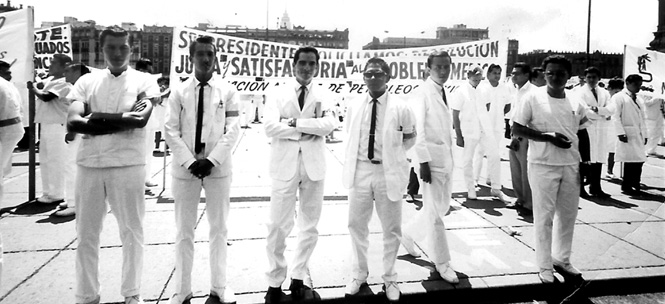
La revuelta de las batas blancas
White Memory
Tipo de producción/Type of Production
Documental/Documentary
Año de producción/Production Year
2009
País/Country
México-Venezuela
Duración/Running time
70 min.
Producción/Production
Dirección/Director
Alex Albert
Producción/Producer
Lenin González
Guion/Screenplay
Luis Cruz Santacruz
Fotografía/Cinematography
Amir Galván y Alex Albert
Edición/Editing
Israel Santamaría
Sonido/Sound
Moisés Carrillo
Música/Music
Raúl Vizzi
Alex Albert
Producción/Producer
Lenin González
Guion/Screenplay
Luis Cruz Santacruz
Fotografía/Cinematography
Amir Galván y Alex Albert
Edición/Editing
Israel Santamaría
Sonido/Sound
Moisés Carrillo
Música/Music
Raúl Vizzi
Sinopsis/Synopsis
En 1964, médicos de todo el país salen a las calles a exigir mejoras salariales y un trato digno como profesionales, deteniendo consultas médicas y sólo atendiendo emergencias por casi un año. Ante la incapacidad del gobierno de resolver el conflicto, algunos involucrados son obligados a politizar la lucha y tomar medidas drásticas para la solución de ése y otros conflictos sociales que se originaban en aquella época, llegando así a formar un grupo guerrillero con la intención de derrocar al presidente. Las consecuencias fueron muy duras, y con el paso del tiempo veríamos que historias de inconformidad y demandas de justicia de diversos grupos sociales tendrían finales más desafortunados.
In 1964, Mexican doctors all over the country took to the streets to demand better salaries and working conditions as professionals, no longer holding consultations and only attending emergencies for almost a year. Given the inability of the Mexican government to resolve the conflict, some of the participants were forced to politicize the struggle and adopt drastic measures to solve this and other social conflicts of the period, forming a guerrilla group bent on overthrowing the president. The consequences were very harsh and, as time went by, we saw that the stories of inconformity and demands for justice of various social groups came to unfortunate ends.
In 1964, Mexican doctors all over the country took to the streets to demand better salaries and working conditions as professionals, no longer holding consultations and only attending emergencies for almost a year. Given the inability of the Mexican government to resolve the conflict, some of the participants were forced to politicize the struggle and adopt drastic measures to solve this and other social conflicts of the period, forming a guerrilla group bent on overthrowing the president. The consequences were very harsh and, as time went by, we saw that the stories of inconformity and demands for justice of various social groups came to unfortunate ends.
Compañías productoras/Production companies
La Maroma Producciones
Formato/Format
Betacam
Reparto/Cast
Rolf Meiners y Miguel Cruz
Locación/Location
Ciudad de México (México)
Idioma/Language
Español
Premios/Awards
·Premio FEISAL al Mejor largometraje documental iberoamericano del XXV Festival Internacional de Cine en Guadalajara, México 2010
Contacto/Contact
La Maroma Producciones
Alex Albert
Etla 3
Col. Condesa
CP 06170, Cuauhtémoc, Ciudad de México
Tels.: (52-55) 5515 1420, 5515 1440
alex@lamaroma.com
Alex Albert
Etla 3
Col. Condesa
CP 06170, Cuauhtémoc, Ciudad de México
Tels.: (52-55) 5515 1420, 5515 1440
alex@lamaroma.com
¿Detectaste algún error en este registro?
Fecha de última modificación: 13 de marzo del 2012, 12:17
Información proporcionada por:
Red Nacional de Información Cultural
Instituto Mexicano de Cinematografía
u-cm
Información proporcionada por:
Red Nacional de Información Cultural
Instituto Mexicano de Cinematografía
u-cm
